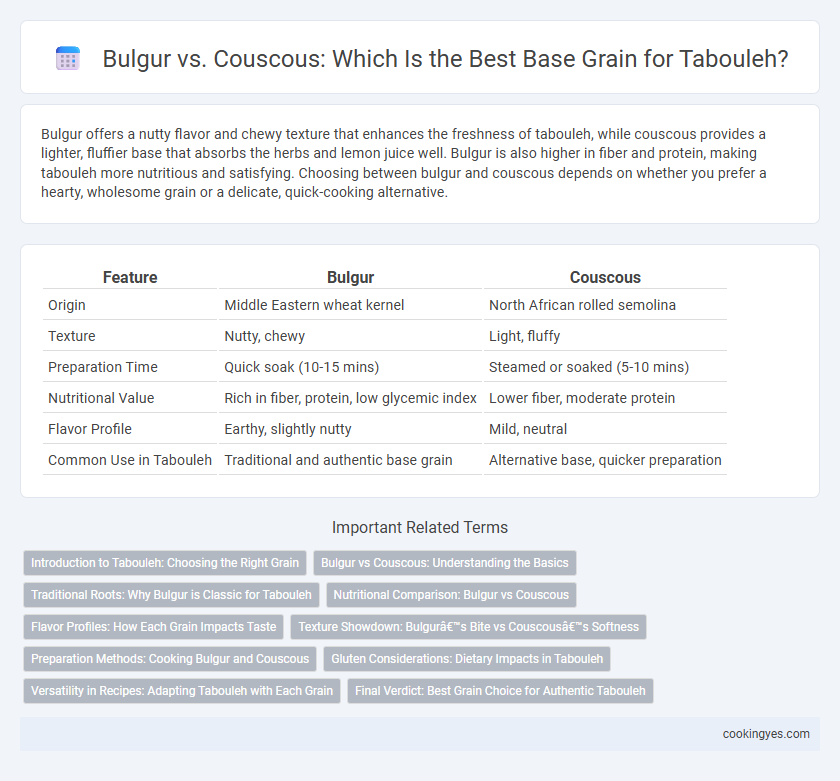Bulgur offers a nutty flavor and chewy texture that enhances the freshness of tabouleh, while couscous provides a lighter, fluffier base that absorbs the herbs and lemon juice well. Bulgur is also higher in fiber and protein, making tabouleh more nutritious and satisfying. Choosing between bulgur and couscous depends on whether you prefer a hearty, wholesome grain or a delicate, quick-cooking alternative.
Table of Comparison
| Feature | Bulgur | Couscous |
|---|---|---|
| Origin | Middle Eastern wheat kernel | North African rolled semolina |
| Texture | Nutty, chewy | Light, fluffy |
| Preparation Time | Quick soak (10-15 mins) | Steamed or soaked (5-10 mins) |
| Nutritional Value | Rich in fiber, protein, low glycemic index | Lower fiber, moderate protein |
| Flavor Profile | Earthy, slightly nutty | Mild, neutral |
| Common Use in Tabouleh | Traditional and authentic base grain | Alternative base, quicker preparation |
Introduction to Tabouleh: Choosing the Right Grain
Tabouleh traditionally features bulgur as its base grain, prized for its nutty flavor and chewy texture that absorbs the fresh flavors of parsley, tomatoes, and lemon juice. Couscous, often mistaken for bulgur, consists of tiny steamed semolina granules and offers a softer, fluffier texture but lacks the distinctive bite bulgur provides. Choosing bulgur enriches the authentic Mediterranean experience and balances the tabouleh's signature herbaceous and citrusy profile.
Bulgur vs Couscous: Understanding the Basics
Bulgur and couscous are both popular grains used as bases in tabouleh, but they differ significantly in texture and preparation. Bulgur is made from cracked wheat that is parboiled and dried, offering a chewy texture and a nutty flavor, while couscous consists of tiny steamed semolina granules, providing a softer and lighter mouthfeel. Understanding these differences helps in selecting the ideal base grain to enhance the authentic taste and texture of traditional tabouleh.
Traditional Roots: Why Bulgur is Classic for Tabouleh
Bulgur stands as the classic base grain for traditional tabouleh due to its deep roots in Middle Eastern cuisine, especially Lebanese and Syrian culinary heritage. Its coarse texture and nutty flavor maintain the authentic lightness and freshness essential to classic tabouleh, contrasting with couscous, which has a smoother texture and is more common in North African dishes. Using bulgur preserves the original balance of parsley, mint, tomatoes, and lemon juice, ensuring the dish's traditional authenticity and cultural significance.
Nutritional Comparison: Bulgur vs Couscous
Bulgur offers higher dietary fiber content and more protein compared to couscous, which provides a lower-calorie option but with less fiber. Bulgur is rich in manganese, magnesium, and iron, contributing to better mineral intake, while couscous contains slightly more selenium. Choosing bulgur as the base grain in tabouleh enhances nutrient density and supports digestive health.
Flavor Profiles: How Each Grain Impacts Taste
Bulgur offers a nutty, earthy flavor with a chewy texture that adds depth to tabouleh, enhancing the freshness of parsley and mint. Couscous, with its mild and slightly buttery taste, provides a softer, more neutral base that absorbs lemon juice and olive oil flavors effectively. The choice between bulgur and couscous significantly influences the overall taste, with bulgur creating a robust, hearty dish, while couscous results in a lighter, subtler flavor profile.
Texture Showdown: Bulgur’s Bite vs Couscous’s Softness
Bulgur offers a chewy and nutty texture that adds a satisfying bite to tabouleh, enhancing the salad's overall mouthfeel with its slightly coarse grains. Couscous, by contrast, provides a softer and fluffier base, creating a delicate texture that blends seamlessly with fresh herbs and vegetables. Choosing bulgur emphasizes a hearty, robust texture, while couscous delivers a light, tender foundation ideal for a more subtle tabouleh experience.
Preparation Methods: Cooking Bulgur and Couscous
Bulgur is traditionally prepared by soaking or simmering coarse cracked wheat in boiling water until tender, requiring about 10-15 minutes to absorb moisture fully. Couscous consists of tiny semolina granules steamed or soaked in hot water for just 5 minutes, making it quicker to prepare than bulgur. Both grains serve as nutrient-rich bases for tabouleh, but bulgur offers a chewier texture while couscous provides a lighter, fluffier consistency.
Gluten Considerations: Dietary Impacts in Tabouleh
Bulgur, made from cracked wheat, contains gluten and is unsuitable for those with celiac disease or gluten sensitivity, which is crucial when selecting a base grain for tabouleh. Couscous, often produced from semolina wheat, also contains gluten but can sometimes have finer textures that alter digestion or allergen impact. For gluten-free diets, alternatives like quinoa or millet are recommended to maintain the traditional salad's structure without compromising dietary restrictions.
Versatility in Recipes: Adapting Tabouleh with Each Grain
Bulgur offers a nutty flavor and chewy texture that enhances traditional Tabouleh, making it ideal for fresh herb and vegetable combinations. Couscous, with its finer, softer grains, absorbs dressings well and creates a lighter, fluffier salad, perfect for incorporating fruits and roasted vegetables. Both grains provide versatile bases that can be customized to suit Mediterranean, Middle Eastern, or fusion recipes, adapting to varied tastes and ingredient availability.
Final Verdict: Best Grain Choice for Authentic Tabouleh
Bulgur is the best grain choice for authentic tabouleh due to its nutty flavor, chewy texture, and ability to absorb fresh herb and lemon juice flavors, which define the salad's character. Couscous, while quicker to prepare, lacks the traditional texture and subtle earthiness that bulgur provides, making it less suited for a genuine tabouleh experience. Bulgarian bulgur's coarse grind maintains the salad's integrity, ensuring the final dish is vibrant and true to its Levantine roots.
Bulgur vs Couscous for Base Grain Infographic

 cookingyes.com
cookingyes.com